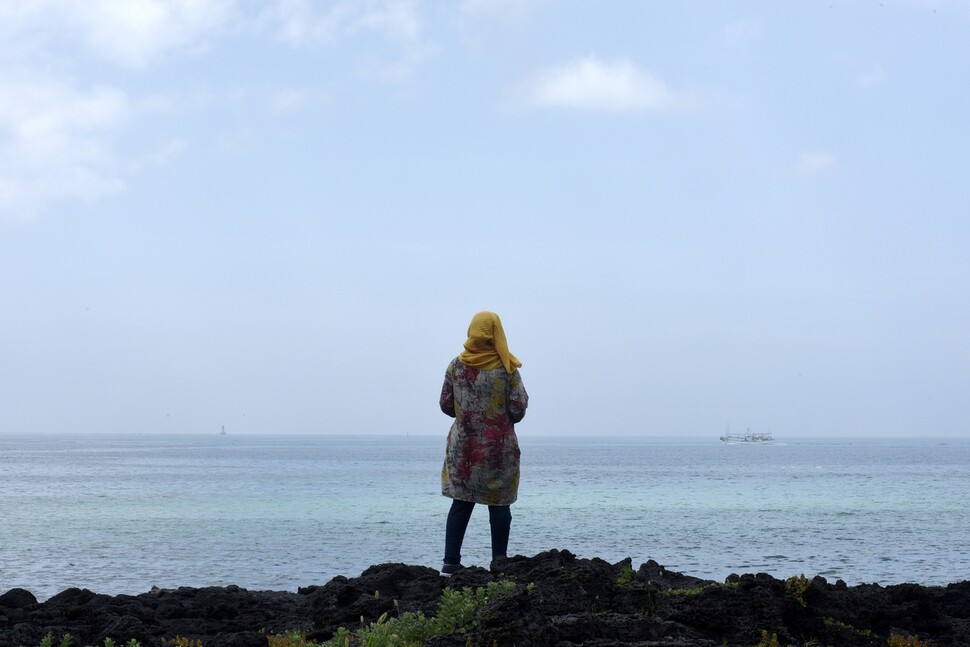hankyoreh
Links to other country sites 다른 나라 사이트 링크
Human rights groups protest S. Korean government’s refusal to grant refugee status to Yemenis

Refugee and human rights groups were up in arms on Oct. 17 after the South Korean government refused to grant refugee status to a single Yemeni applicant on Jeju Island. The groups specifically called on the government to withdraw decisions denying refugee status outright to 34 of the applicants.
In a statement published that day, the Refugee Human Rights Network and Jeju Residents for the Human Rights of Jeju Refugees declared it “astonishing that not a single one of 373 people receiving review decisions was granted refugee status.”
“This kind of refugee status recognition rate makes one question why the current refugee system even exists,” they said.
Regarding the Ministry of Justice’s decision to deny refugee status outright to 34 applicants without granting them humanitarian sojourn status, the groups said, “It is unclear what the Ministry of Justice saw as its legal basis for repatriating them.”
“This recognition refusal should be withdrawn,” the groups insisted.
The Refugee Human Rights Network is an organization encompassing 17 groups including Advocates for Public Interest Law (APIL) and the Refugee Rights Center (NANCEN). Jeju Residents for the Human Rights of Jeju Refugees is an organization of 39 groups with roots in the Jeju region, including the justice and peace committee of the Presbyterian Presbytery of Jeju and Jeju Solidarity for Civil Rights. The groups claimed the government’s review did not confirm to international human standards.
“According to the Refugee Convention, refugee reviews must be conducted specifically and individually in terms of the individual situations for each applicant, yet the government conducted uniform reviews solely in terms of the local situation with the civil war [in Yemen],” said Jeju Residents co-representative Kim Seong-in.
“Avoiding forced conscription is considered one of the traditional grounds for refugee protection, yet this was not reflected at all,” Kim said.
S. Korea notably stingy about granting refugee status
Indeed, South Korea is viewed as being notably stingy about granting refugee status. After its 1992 move to join the Convention Relating to the Status of Refugees – which guarantees the human rights and basic freedoms of refugees – a total of 22,792 people applied for refugee status in South Korea between 1994 and 2016. Refugee status was granted to 672 and humanitarian sojourn status to 1,156 – respective rates of 3.0 and 5.1 percent, not including cases where asylum seekers withdrew their applications.
In contrast, Germany, which is seen as one of the most generous countries in terms of accepting refugees, acknowledged the refugee status of 123,909 out of 603,428 applicants in 2017 in their initial reviews alone, a rate of 20.5 percent. Those granted refugee status are permitted to stay for three years and reunite with their family members; permanent residence status may be subsequently granted based on reviews of their continued employment and understanding of German.
Another 98,074, or 16.3 percent, received “complementary protection,” a lower level of status from refugee recognition. Those granted this status are allowed to stay for periods of one year, with reviews every two years on whether they can extend their stay; permanent residence applications are possible after five years. An additional 39,659 applicants, or 6.6 percent, were granted humanitarian sojourn status, which allows the right to residence for one-year periods subject to annual review.
By Kim Kyung-wook, staff reporter
Please direct comments or questions to [english@hani.co.kr]

Editorial・opinion
![[Column] Season 2 of special prosecutor probe may be coming to Korea soon [Column] Season 2 of special prosecutor probe may be coming to Korea soon](https://flexible.img.hani.co.kr/flexible/normal/500/300/imgdb/original/2024/0426/3317141030699447.jpg) [Column] Season 2 of special prosecutor probe may be coming to Korea soon
[Column] Season 2 of special prosecutor probe may be coming to Korea soon![[Column] Park Geun-hye déjà vu in Yoon Suk-yeol [Column] Park Geun-hye déjà vu in Yoon Suk-yeol](https://flexible.img.hani.co.kr/flexible/normal/500/300/imgdb/original/2024/0424/651713945113788.jpg) [Column] Park Geun-hye déjà vu in Yoon Suk-yeol
[Column] Park Geun-hye déjà vu in Yoon Suk-yeol- [Editorial] New weight of N. Korea’s nuclear threats makes dialogue all the more urgent
- [Guest essay] The real reason Korea’s new right wants to dub Rhee a founding father
- [Column] ‘Choson’: Is it time we start referring to N. Korea in its own terms?
- [Editorial] Japan’s rewriting of history with Korea has gone too far
- [Column] The president’s questionable capacity for dialogue
- [Column] Are chaebol firms just pizza pies for families to divvy up as they please?
- [Column] Has Korea, too, crossed the Rubicon on China?
- [Correspondent’s column] In Japan’s alliance with US, echoes of its past alliances with UK
Most viewed articles
- 1AI is catching up with humans at a ‘shocking’ rate
- 2After election rout, Yoon’s left with 3 choices for dealing with the opposition
- 3[Column] Season 2 of special prosecutor probe may be coming to Korea soon
- 4No good, very bad game for Korea puts it out of Olympics for first time since 1988
- 5Korea’s 1.3% growth in Q1 signals ‘textbook’ return to growth, says government
- 6Is Japan about to snatch control of Line messenger from Korea’s Naver?
- 7[Column] Park Geun-hye déjà vu in Yoon Suk-yeol
- 8Division commander ordered troops to enter raging flood waters before Marine died, survivor says
- 9Marriages nosedived 40% over last 10 years in Korea, a factor in low birth rate
- 10‘We must say no’: Seoul defense chief on Korean, USFK involvement in hypothetical Taiwan crisis